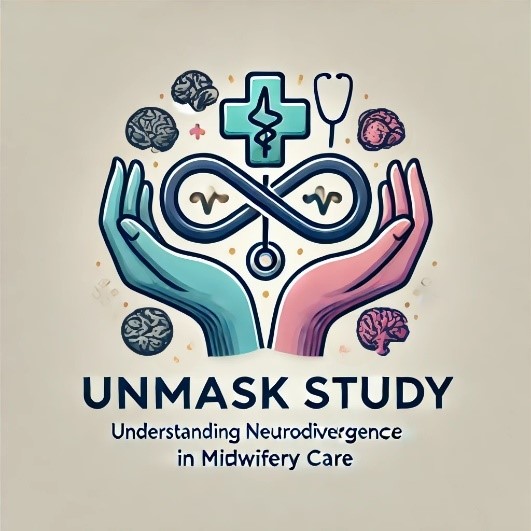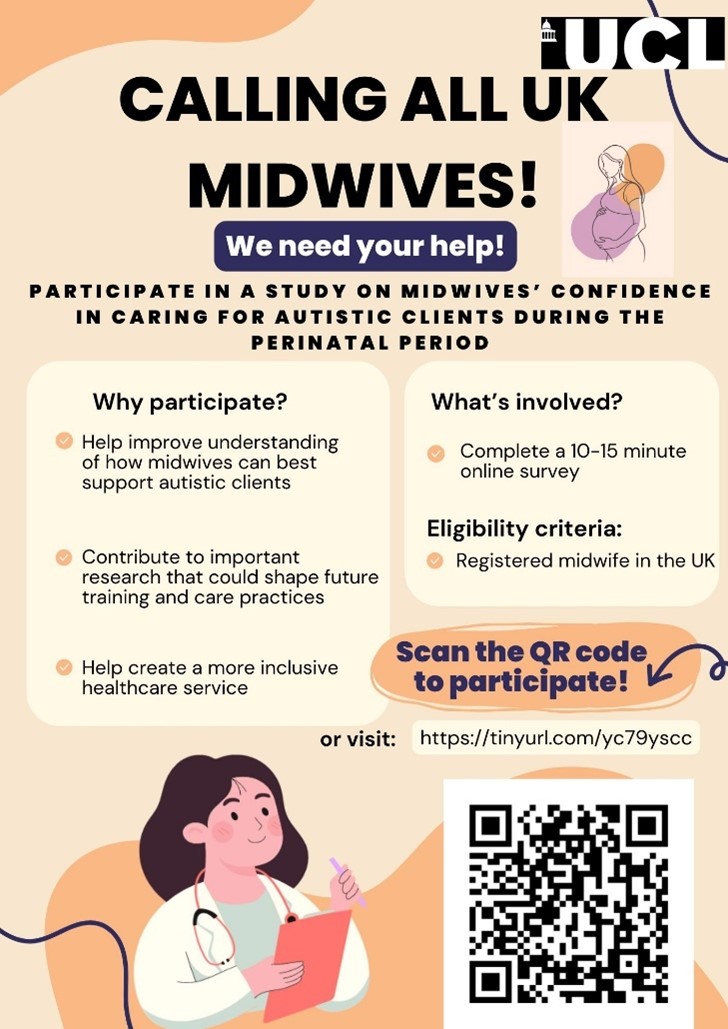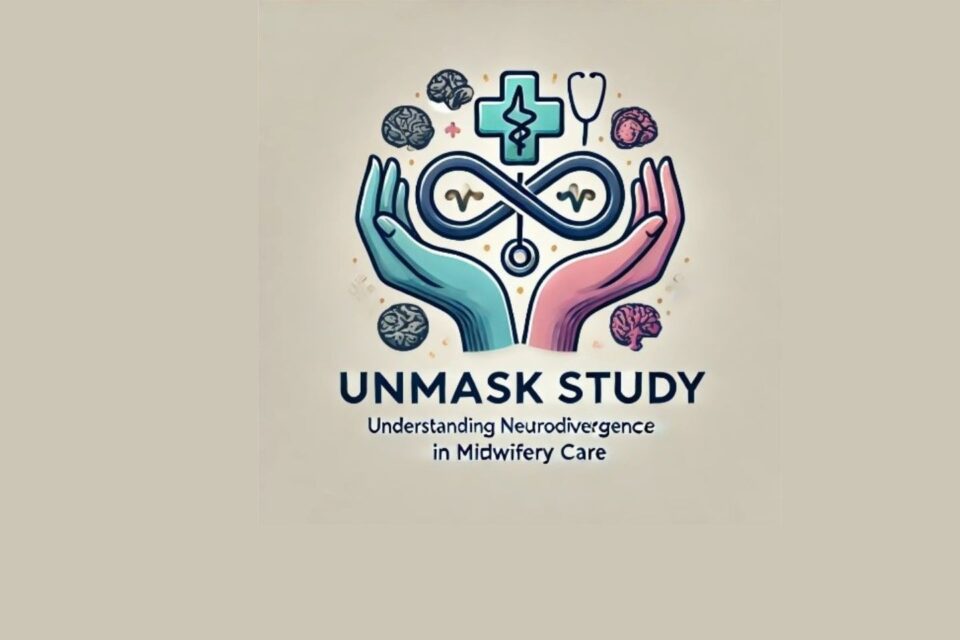The Autistic Experience of Pregnancy and Birth
Pregnancy and childbirth are transformative experiences, but for autistic women and birthing people, these milestones can bring unique challenges. While autism is widely recognised as a neurodevelopmental difference, its intersection with pregnancy and childbirth remains largely underexplored in healthcare research. Within this article, midwife, Nicolette Porter, delves into the experiences of autistic individuals during pregnancy, highlights disparities in outcomes, and emphasises the importance of equipping midwives with the knowledge and confidence to support neurodivergent clients. You are invited to participate in the UNMASK study. To complete the survey visit: https://tinyurl.com/yc79yscc
_________________________________________________
Pregnancy and childbirth can be particularly challenging for autistic individuals due to unique sensory, communication, and processing needs. Existing research consistently highlights negative experiences among autistic birthing individuals, emphasising a pattern of unmet service needs, perceived judgment, and inadequate support from healthcare professionals.
A significant study by Hampton et al. (2023) revealed that autistic individuals were more likely to report negative interactions with maternity care providers, with many feeling judged or misunderstood. Participants in the study expressed that healthcare professionals often lacked knowledge about autism, which led to a failure in meeting their sensory and communication needs. For example, autistic individuals frequently cited issues such as bright lights, loud noises, and being touched without warning as sources of distress.
Additionally, unclear communication about medical procedures and an absence of consistent care plans compounded their anxiety and feelings of exclusion.
Hampton et al. also noted that autistic birthing people often struggled to advocate for themselves in healthcare settings, fearing negative repercussions or being labelled as “difficult.” These experiences created barriers to accessing care, with some individuals avoiding healthcare settings altogether.
Addressing these issues requires an autism-informed approach to maternity care, emphasising clear communication, flexibility in care delivery, and an understanding of individual sensory needs. Personalised care plans and autism-awareness training for healthcare professionals may significantly improve the maternity experience for autistic clients.
Differences in Outcomes
Autistic individuals face increased risks of adverse pregnancy outcomes compared to their non-autistic peers. In their study, Pohl et al. (2020) examined the physical and mental health outcomes for autistic individuals during the perinatal period, uncovering significant disparities:
– Postnatal Depression: Autistic individuals were found to have a higher likelihood of experiencing postnatal depression, with rates significantly exceeding those reported in the general population. This was attributed to factors such as sensory overwhelm, lack of support, and negative interactions with healthcare providers.
– Preterm Birth and Caesarean Delivery: The study also revealed increased rates of preterm birth and elective caesarean delivery among autistic birthing people. These outcomes were partly linked to heightened levels of antenatal anxiety and a preference for greater control over the birthing process to mitigate sensory and communication challenges.
– Unmet Support Needs: Many participants reported that their sensory sensitivities and need for predictable care routines were not adequately addressed, leading to feelings of isolation and dissatisfaction with their maternity care experiences.
Pohl et al.’s findings underline the urgent need for targeted interventions to improve outcomes for autistic individuals during the perinatal period. Tailored support strategies, such as antenatal classes designed for autistic parents and sensory-friendly birthing environments, are critical to addressing these disparities.
Why Midwives’ Knowledge Matters
Autism is more prevalent than many might realise, affecting an estimated 1 in 100 adults according to NICE (2020). However, this figure is widely considered an underestimate due to barriers in obtaining formal diagnoses. These barriers include long waiting lists, a lack of diagnostic services for adults, and biases in diagnostic criteria that often overlook autistic traits in women and nonbinary individuals.
Given the prevalence of autism and the likelihood that midwives will encounter autistic clients during their careers, it is imperative that midwives are equipped to provide high-quality care to all clients. This is not only a matter of clinical competence but also one of equality, diversity, and inclusion. Providing autism-aware care ensures that all clients receive equitable treatment, consistent with ethical and professional standards.
Midwives must understand how autism manifests across different individuals and recognise the unique challenges faced by autistic clients during pregnancy, childbirth, and the postpartum period. This requires a commitment to ongoing education, reflection, and the adaptation of care practices to ensure inclusivity. An autism-informed approach enhances the birthing experience for autistic individuals and promotes better outcomes, fostering trust and collaboration between clients and care providers.
 The UNMASK Study
The UNMASK Study
The Understanding Neurodivergence: Midwives’ Autism Care Self-Efficacy and Knowledge (UNMASK) study seeks to address this literature gap. This study, conducted with University College London (UCL) as part of my MSc research, is designed to explore midwives’ knowledge, confidence, and attitudes toward caring for autistic individuals during the perinatal period.
Why this study matters
The UNMASK study is the first of its kind to comprehensively examine midwives’ perceptions of their ability to support autistic individuals. By identifying knowledge gaps and barriers, the study aims to inform the development of targeted training programs and resources to enhance midwifery practice.
 Who Can Participate?
Who Can Participate?
We are currently recruiting participants for the UNMASK study. To be eligible, you must:
• Be a registered midwife practicing in the UK.
Participation involves completing a brief, anonymous online survey, which takes only 10 minutes. The survey includes questions about midwives’ attitudes, self-efficacy, and knowledge related to autism care.
Ensuring Anonymity
To protect participants’ privacy, the survey is entirely anonymous, and no identifying information will be collected. The data will be used solely for research purposes and to inform future educational initiatives aimed at improving care for autistic individuals.
To complete the survey visit: https://tinyurl.com/yc79yscc
Your participation in the UNMASK study can help create a more inclusive and supportive healthcare system for autistic individuals. By sharing your experiences and insights, you contribute to shaping the future of midwifery care.
Conclusion
Autism and pregnancy is a growing area of interest in healthcare research, with significant implications for midwifery practice. By understanding the unique challenges autistic individuals face, midwives can play a critical role in delivering compassionate, personalised care that supports positive outcomes for all. Join us in advancing this vital research by participating in the UNMASK study and sharing the survey link within your networks. Together, we can build a more inclusive maternity care system that truly meets the needs of every birthing individual.
References
Hampton, S., Man, J., Allison, C., et al (2023). A qualitative exploration of autistic mothers’ experiences I: Pregnancy experiences. Autism, 27(5), 1271–1282. https://doi.org/10.1177/13623613221132435
Pohl, A. L., Crockford, S. K., Blakemore, M., et al (2020). A comparative study of autistic and non-autistic women’s experience of motherhood. Molecular Autism, 11(1), 3. https://doi.org/10.1186/s13229-019-0304-2
NICE (2024) Autism in adults https://cks.nice.org.uk/topics/autism-in-adults/background-information/prevalence/
Nicolette Porter, Midwife, London
January 2025



1 comment
Thank you! I’m a PhD candidate and Midwife in Perth Australia (from the UK originally) I’m studying similar! https://www.sciencedirect.com/science/article/pii/S1871519224002853?via%3Dihub We will be focusing more on ADHD and AuDHD experiences, lets connect 🙂
Comments are closed.